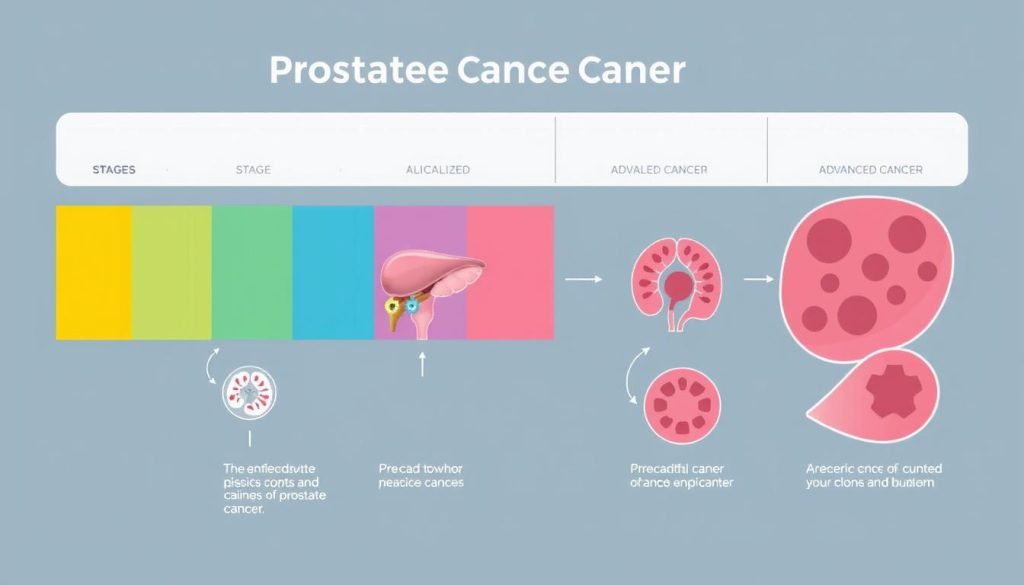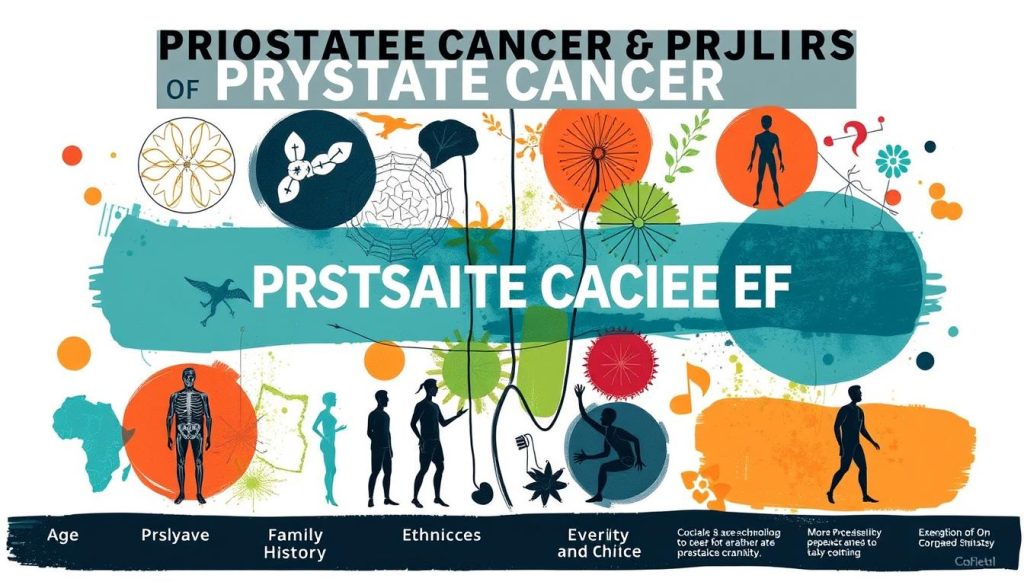Prostate cancer can range from slow-growing to very aggressive. Knowing the stages of prostate cancer is key for patients and their families. This guide will cover diagnosis, treatment, and survival rates to give a clear view of this common disease.
We’ll look at what affects prostate cancer prognosis, like early detection and advanced treatments. By exploring prostate cancer from diagnosis to treatment, we aim to give readers knowledge and hope.
This detailed look will help you understand how doctors measure prostate cancer severity. It will also show how they choose the best treatments. Let’s explore prostate cancer stages and what they mean for those diagnosed.
Understanding How Bad Is Prostate Cancer: An Overview
Prostate cancer can be very different in severity. It’s important to know its signs and how it’s diagnosed. This overview will help you understand how bad prostate cancer can be and what factors are important in assessing it.
Common Signs and Early Detection
It’s key to catch prostate cancer early for better treatment. Some common signs include:
- Frequent urination, especially at night
- Difficulty starting or stopping urination
- Weak or interrupted urine flow
- Blood in urine or semen
- Unexplained pain in the pelvic area
Early detection through regular screenings can greatly improve outcomes.
Initial Diagnosis Process
Diagnosing prostate cancer involves several steps:
- PSA blood test
- Digital rectal exam
- Prostate biopsy
- Imaging tests (MRI, CT scan)
These tests help figure out how bad prostate cancer might be in each case.
Risk Levels and Assessment Methods
It’s crucial to assess prostate cancer risk factors to determine severity. Key factors include:
- Age (risk increases after 50)
- Family history
- Race (higher risk in African American men)
- Diet and lifestyle choices
Doctors use these factors and test results to assess how bad prostate cancer is. They then plan the best treatment strategies.
Prostate Cancer Staging System Explained
Knowing about prostate cancer stages is key for planning treatment. The staging system lets doctors see how far the cancer has spread. It helps them choose the best treatment.
TNM Classification System
The TNM system looks at three main things:
- T: Tumor size and local spread
- N: Lymph node involvement
- M: Metastasis to distant organs
Each part gets a number or letter to show how serious it is. This detailed look helps doctors decide on treatment. It also helps predict how well the treatment will work.
Stage Grouping from I to IV
Prostate cancer stages go from I to IV. Stage I is the least severe, and stage IV is the most advanced. Here’s a quick summary:
| Stage | Description |
|---|---|
| I | Cancer confined to prostate, slow-growing |
| II | Cancer still in prostate, may be aggressive |
| III | Cancer spread beyond prostate, not to distant sites |
| IV | Cancer spread to distant organs or tissues |
Gleason Score and Grade Groups
The Gleason score helps spot aggressive prostate cancer. It goes from 6 to 10, with higher scores meaning more aggressive tumors. Grade Groups make this easier to understand:
- Grade Group 1: Gleason 6
- Grade Group 2-3: Gleason 7
- Grade Group 4-5: Gleason 8-10

This grading system helps doctors and patients understand the cancer better. It helps them make better treatment choices.
Measuring Prostate Cancer Severity
It’s vital to know how severe prostate cancer is to choose the right treatment. Doctors use different ways to figure out how far and fast the cancer is growing. This helps them decide the best care for each patient.
Imaging studies are key in checking how bad prostate cancer is. MRI scans give clear pictures of the prostate, spotting any odd spots. CT and bone scans help see if the cancer has spread to other parts.
Biomarkers are also crucial in checking prostate cancer severity. PSA levels are watched closely, as high levels mean the cancer might be aggressive. New tests like the Prostate Health Index (PHI) and the 4Kscore give even better risk info.
For advanced prostate cancer, more tests might be needed. These include counting tumor cells and genetic tests. These tests help doctors guess how the cancer will act and how it will react to treatments.
Getting the right measure of prostate cancer severity is key to good treatment plans. It helps doctors tell apart slow-growing cancers that might just need watching and aggressive cancers that need quick action. This careful approach leads to better results and a better life for patients.
Factors Affecting Prostate Cancer Prognosis
Understanding prostate cancer prognosis involves looking at several key factors. These elements play a crucial role in determining the course of the disease and potential outcomes for patients.
Age and Overall Health Impact
A man’s age and general health significantly influence his prostate cancer prognosis. Older men might face more challenges in treatment due to other health issues. Younger, healthier men often have better outcomes.

PSA Level Significance
PSA (Prostate-Specific Antigen) levels are a critical marker in prostate cancer. Higher PSA levels may indicate more aggressive cancer or a larger tumor. Doctors use PSA trends to track cancer progression and treatment effectiveness.
Genetic and Family History Considerations
Genetics play a role in prostate cancer risk factors. Men with close relatives who’ve had prostate cancer face a higher risk. Certain genetic mutations, like BRCA1 and BRCA2, can also increase the likelihood of developing aggressive prostate cancer.
| Factor | Impact on Prognosis |
|---|---|
| Age | Younger age often linked to better outcomes |
| PSA Level | Lower levels typically indicate better prognosis |
| Family History | May increase risk of aggressive cancer |
By considering these factors, doctors can better predict prostate cancer prognosis and tailor treatment plans to each patient’s unique situation. Regular check-ups and open communication with healthcare providers are key in managing prostate cancer effectively.
Treatment Options Based on Cancer Stage
Prostate cancer treatment options change based on the disease’s stage and severity. Doctors create a treatment plan that fits each patient’s needs. They look at age, health, and cancer details.
Early-Stage Treatment Approaches
For early-stage prostate cancer, active surveillance is often recommended. This means regular check-ups and tests to watch the cancer. Surgery or radiation might be needed to remove or shrink tumors.
Advanced Stage Interventions
Advanced prostate cancer needs stronger treatments. Hormone therapy lowers testosterone to slow cancer growth. Chemotherapy uses drugs to kill cancer cells everywhere in the body. These treatments help manage symptoms and extend life.
Emerging Therapeutic Options
New treatments for prostate cancer are always being developed. Immunotherapy uses the body’s immune system to fight cancer. Targeted therapies target specific genetic changes in tumors. Clinical trials offer access to new treatments not yet widely available.
| Treatment Stage | Common Options | Potential Benefits |
|---|---|---|
| Early-Stage | Active surveillance, Surgery, Radiation | Preserves quality of life, Potential cure |
| Advanced Stage | Hormone therapy, Chemotherapy | Slows cancer growth, Manages symptoms |
| Emerging Therapies | Immunotherapy, Targeted therapy | Novel approaches, Personalized treatment |
Choosing the right treatment plan is important. Patients should talk to their healthcare team about all options. This helps make informed decisions about prostate cancer care.
Survival Rates and Quality of Life
Prostate cancer survival rates give hope to many. The 5-year survival rate for prostate cancer is 98%. This means 98 out of 100 men diagnosed will live at least 5 years after finding out.
How long you live with prostate cancer depends on when it’s found. If caught early, the 5-year survival rate is nearly 100%. If it’s found in other parts of the body, the rate drops to 31%.
| Stage | 5-Year Survival Rate |
|---|---|
| Localized | Nearly 100% |
| Regional | About 100% |
| Distant | 31% |
Living well after prostate cancer is possible with the right care. Many men lead active, happy lives after treatment. Side effects like trouble with urination or sex can happen but often get better with time.
“I was diagnosed with prostate cancer 10 years ago. Today, I’m cancer-free and living life to the fullest. Early detection and treatment made all the difference.”
Things that affect how long you live with prostate cancer include your age, health, and how well you respond to treatment. Regular check-ups and following your doctor’s advice are key to living a long, good life.
Managing Advanced Prostate Cancer
Advanced prostate cancer brings big challenges. Patients and their teams work hard to manage symptoms and improve life quality. They use hormone therapy, chemotherapy, and targeted treatments to slow cancer growth and reduce pain.
Pain control is crucial for those with advanced prostate cancer. Doctors use medicines, radiation, or nerve blocks to manage pain. Physical therapy and nutrition counseling also help improve well-being. A team of specialists creates a comprehensive care plan.
Clinical trials offer hope for advanced prostate cancer patients. These studies test new drugs and treatment combinations. Patients should discuss the benefits and risks with their doctors. Even with advanced disease, new treatments help men live longer and feel better.
FAQ
Q: How serious is prostate cancer compared to other cancers?
A: Prostate cancer’s severity varies a lot. It’s the second most common cancer in men worldwide but often grows slowly. Many men with it live long without major health problems. But, aggressive types can be deadly.
The 5-year survival rate for early prostate cancer is nearly 100%. But, for advanced cases, it drops to about 30%.
Q: What are the early signs of prostate cancer?
A: Early prostate cancer usually has no symptoms. But, if symptoms do show up, they might include:
• Frequent urination, especially at night
• Trouble starting or stopping urination
• Weak or interrupted urine flow
• Blood in urine or semen
• Erectile dysfunction
• Pain or burning during urination
• Discomfort in the pelvic area
It’s key to remember these symptoms can also mean non-cancerous conditions. Regular screenings are vital for early detection.
Q: How is prostate cancer diagnosed?
A: Diagnosing prostate cancer involves several steps:
1. PSA (Prostate-Specific Antigen) blood test: High levels might mean cancer
2. Digital Rectal Exam (DRE): A physical check for prostate issues
3. Prostate biopsy: Done if PSA or DRE results are concerning
4. Imaging tests: MRI, CT scans, or bone scans to see if cancer has spread
Q: What factors influence prostate cancer prognosis?
A: Several things affect prostate cancer prognosis:
• Stage of cancer at diagnosis
• Gleason score (cancer grade)
• PSA level
• Age and overall health
• Response to treatment
• Genetic factors and family history
• Presence of other health conditions
Q: What are the stages of prostate cancer?
A: Prostate cancer stages are based on the TNM system:
• Stage I: Cancer is in a small area of the prostate
• Stage II: Cancer is in the prostate but might be larger or in both lobes
• Stage III: Cancer has spread to nearby tissues
• Stage IV: Cancer has spread to distant parts of the body, like bones or organs
Each stage has specific criteria that affect treatment choices and prognosis.
Q: What treatment options are available for prostate cancer?
A: Treatment options vary based on cancer stage and aggressiveness:
• Active surveillance for low-risk cases
• Surgery (radical prostatectomy)
• Radiation therapy (external beam or brachytherapy)
• Hormone therapy
• Chemotherapy
• Immunotherapy
• Targeted therapy
• Cryotherapy
• High-intensity focused ultrasound (HIFU)
The best treatment plan is decided by a healthcare team, considering the patient’s health and preferences.
Q: Can prostate cancer be cured?
A: Prostate cancer can often be treated successfully, especially if caught early. Localized prostate cancer (stages I and II) has a high cure rate with the right treatment. But, advanced prostate cancer (stages III and IV) is harder to cure.
It can often be managed as a chronic condition with treatments to extend life and maintain quality of life.
Q: How does advanced prostate cancer affect quality of life?
A: Advanced prostate cancer and its treatments can greatly affect quality of life:
• Urinary incontinence
• Erectile dysfunction
• Bone pain from metastases
• Fatigue from treatments
• Emotional and psychological stress
However, many supportive care options are available to manage these effects and maintain a good quality of life. Palliative care specialists can help address symptoms and improve overall well-being.
Q: Are there any new treatments or clinical trials for prostate cancer?
A: Yes, prostate cancer research is ongoing, with several promising areas:
• Immunotherapy advancements
• Targeted therapies based on genetic profiling
• PARP inhibitors for specific genetic mutations
• Proton beam radiation therapy
• New hormone therapies
• Focal therapies for localized disease
Patients, especially those with advanced cancer, should discuss clinical trial opportunities with their oncologists to access cutting-edge treatments.


















